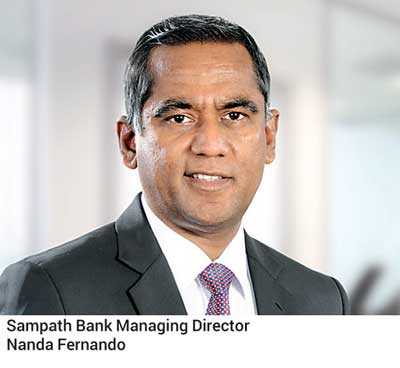Saturday Feb 21, 2026
Saturday Feb 21, 2026
Monday, 22 July 2019 00:48 - - {{hitsCtrl.values.hits}}
Sampath Bank said last week, it was happy with the success of its Rs. 12.1 billion Rights Issue, bringing the total raised to over Rs. 33 billion in three years midst challenging market and country conditions.
The Bank last month concluded a 7 for 23 Rights Issue at Rs. 136 per share, offering 89 million new shares. It was the third Rights Issue in past three years with the first exercise in 2017 coming after 12 years. The previous two issues raised Rs. 9.1 billion and Rs. 12.1 billion, respectively. 
“Given the tough market conditions and country’s situation in the aftermath of the Easter Sunday tragedy, we are happy with the successful conclusion of the Rights Issue,” Sampath Bank Managing Director Nanda Fernando told journalists.
“The pricing of the issue, performance of the bank, and the purpose of the fund utilisation helped to make the Rights Issue a success,” he emphasised.
The Rights was planned long before the 21 April terror attacks. However, the Bank went ahead with the fundraiser with confidence of shareholder support.
“When our Rights was announced, the market price was around Rs. 225 and the deep discount was to give a benefit to our loyal and valued shareholders, who had extended their support in our two previous issues,” Fernando recalled.
However, following the Easter Sunday attacks on three five-star hotels and an equal number of churches killing 250 people, the stock market and investor sentiment dipped.
Fernando was relieved that the Sampath share price didn’t decline below the Rights Issue price though he noted that there had been a few cases of some companies suffering that fate in the past.
The pricing of the issue, performance of the bank, and the purpose of the fund utilisation helped to make the Rights Issue a success. Overall, we are happy that shareholders and investors have confidence in Sampath Bank’s future prospects. Post Rights Issue, which was at Rs. 136 per share, the share price has bounced to Rs. 150 – Sampath Bank Managing Director Nanda Fernando
In terms of existing shareholder subscription, the amount was 63.53 million shares leaving a shortfall of 25.46 million shares worth Rs. 3.4 billion or 30% of the issue. Fernando said that almost all major foreign and local shareholders subscribed to the Rights and the management decided to offer the unsubscribed part to new institutional investors thereby completing the fundraising.
Post Rights Issue, in tandem with pick up in market and investor sentiment, Sampath Bank share had recovered by 10% to close last week at Rs. 150. “Overall, we are happy that shareholders and investors have confidence in Sampath Bank’s future prospects,” he added.
Funds raised from the Rights Issue will be utilised to improve Common Equity Tier 1 capital of the Bank under the Basel III regulations as well as fund the expansion of the Bank’s business.
Fernando said that Sampath Bank has managed to grow midst challenging times. He said last year’s profit after tax was lower on account of the Debt Repayment Levy and appreciation of the currency, which wasn’t the case in the previous year. This year, the Bank’s net interest income has grown by 33% in first quarter compared with a year earlier. Its cost to income ratio has been on the decline from 54.8% in 2014 to 35.9% last year as well.
“We are making good progress on our digital transformation, which we started a few years ago. Our priority Key Performance Indicators are growth, cost and risks. With improved macroeconomic conditions, our revenue generation measures will kick in and we will be able progress better,” he added.
Sampath Bank echoed industry concerns of rising Non-Performing Loans (NPLs) in the banking sector. According to Fernando, NPLs have almost doubled in the past one and half years. “It is the biggest challenge,” he emphasised. In 2014, industry-wide NPLs amounted to 4.25% and declined to 2.5% in 2017, but by 1Q 2019, it had increased to 4.2%. At Sampath Bank, it is 4.87% on account of prudent and stringent classification.
Credit growth is also negative by the end of 1Q on an annualised basis whilst for Sampath, it was a 3.2% growth. This is very low in comparison to the 20% average growth in the recent past. “Given the challenging economic conditions since last quarter of 2018, the Bank has been focusing on credit quality than volume.”
Fernando believes that from an economic standpoint, Sri Lanka is at the bottom of a cycle and forecast is a rebound in growth. With greater political stability and improved macroeconomic conditions, the NPLs are likely to decline. Sampath is forecasting its credit growth in 2019 to be around 10% whilst expecting a gradual reduction in lending rates.
